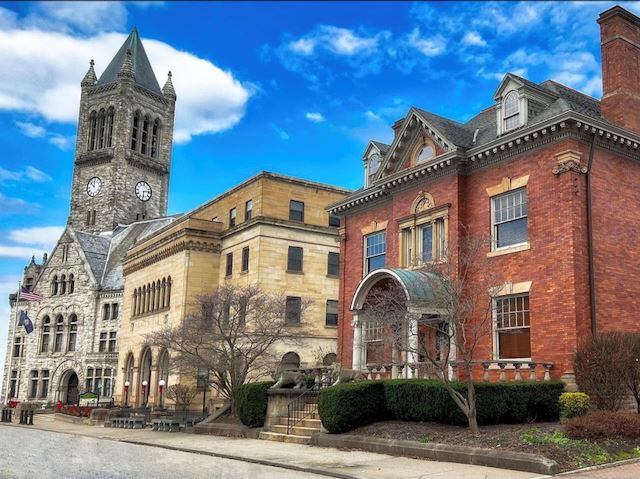
By Staff Writer
The Independent Penn
Published: June 14, 2025
FAYETTE COUNTY, PA — A growing number of Fayette County residents are demanding answers about what happened to over $2.5 million in hotel tax revenue collected in 2023. While county officials insist the funds are used to promote tourism, new information obtained by The Independent Penn raises serious questions about how much money is being spent—and who’s keeping track of it.
According to financial data available through GO Laurel Highlands, Fayette County’s designated tourism marketing agency, only $1,034,375.50 was awarded in tourism-related grants for 2024. That includes capital, operational, marketing, and visitor center grants—well short of the $3.6 million in hotel tax revenue collected by the county in 2023.
Commissioner: “We Don’t Have a Breakdown”
In a public exchange with Independent Penn contributor and radio host Melanie Stringhill Patterson, Commissioner Scott Dunn pushed back on claims that the money is unaccounted for.
“Fayette County MAGA Patriots,” Dunn wrote, “the $2.5 million (your math) is used by the tourist marketing agency to market Fayette County tourism. We don’t have a breakdown because the money is not used by the county. It is used by the marketing tourist agency. We transfer the money to the tourist marketing agency per the law.”
However, that statement directly contradicts what The Independent Penn has learned through its own investigation.
Tourism Agency: “We Don’t Receive 96%”
While state law mandates that 96% of hotel tax revenue must be transferred to the designated tourism marketing agency, GO Laurel Highlands has confirmed to The Independent Penn’s investigative team that they do not receive the full 96% of Fayette County’s hotel tax revenue. The agency’s public records show only about $1 million in total grant spending for 2024—nearly identical to 2023.
When asked to clarify whether they receive and use the full 96% allocation for additional marketing efforts beyond the grants, GO Laurel Highlands declined to provide further detail.
This gap between what the County claims is transferred and what the tourism agency confirms receiving raises troubling questions.
“This Is Fay-Penn All Over Again”
“This is just like Fay-Penn,” Patterson said, referencing the ongoing scandal involving the now-embattled Fay-Penn Economic Development Council, where a former finance director was recently charged with theft and forgery related to public funds.
“Just like they dropped the oversight ball on Fay-Penn, they’re now doing it again with the hotel tax. Millions in taxpayer money is being moved around, and no one can provide a clear, audited breakdown.”
Several residents have filed Right-to-Know (RTK) requests seeking requisition forms, monthly revenue ledgers, and itemized reports on the 4% administrative fee the County retains. Those requests, however, have resulted in incomplete responses, with key financial records missing or withheld.
“Why are taxpayers being asked to file repeated RTKs just to see how their own money is spent?” Patterson asked. “If nothing is missing, then nothing should be hidden.”
The Law Is Clear—But Oversight Is Not
Under Pennsylvania Title 16, Section 17507, counties may collect a 5% hotel room tax, of which 96% is to be transferred to a designated tourist promotion agency, and 4% may be retained for administrative purposes.
In theory, that system is meant to promote local tourism by funding events, infrastructure, and marketing. In practice, however, there appears to be little to no accountability over how much money is actually transferred—or how much is spent and by whom.
Internal county emails obtained through a separate RTK appeal revealed that even county officials were unsure how the 4% admin fee—about $144,000—is used. One official openly asked how to calculate insurance and payroll costs for employees allegedly paid through the fund. Another admitted the fee doesn’t fully cover the department’s budget anyway.
A Call for Transparency and Audit
As concerns mount, Patterson and others are calling for a forensic audit of the Hotel Tax Fund, and a public commitment from County Commissioners to publish all collections, disbursements, and vendor contracts related to the fund.
“You don’t get to say ‘it’s not our responsibility’ after you collect the money,” Patterson said. “The taxpayers didn’t elect GO Laurel Highlands. They elected the County Commissioners. And those Commissioners are still responsible for making sure every dollar collected is properly accounted for and lawfully spent.”
“So again,” she concluded, “we’re not accusing anyone of criminal activity. We’re demanding transparency. Open the books—all of them. The people deserve nothing less.”
To date, no official breakdown or full financial report has been provided by the County in response to the claims.
In the meantime, the people of Fayette County are still asking one simple question:
Where’s the money?
Have tips or documents related to Fayette County’s hotel tax fund? Contact The Independent Penn at tips@independentpenn.com




